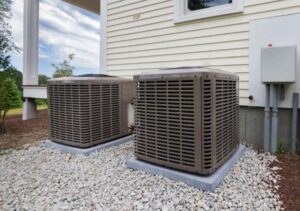How Much Does Garage Heater Installation Cost? (2022)
- Typical Range: $150 to $4,000
- National Average: $2,075
Garages are multifunctional spaces that can do a lot more than just store vehicles. Whether a homeowner wants to create an ultimate garage workshop, a yoga studio, or an additional family room, their garage could become the perfect space. Increasing a garage’s functionality will likely require installing some form of temperature control to keep the area warm in the cold winter months. Using a garage heater can be energy efficient and even prolong the life of the vehicles housed within it, and it can also help extend the home’s total living space.
How much does a garage heater cost? According to Angi, garage heater installation cost ranges from $150 to $4,000, with a national average of $2,075. The cost depends on the type of heater being installed—garage heaters can be powered with fuel or electricity. Other factors include the unit’s heat rating, the addition of new gas lines or vent installations, and labor for installation. This guide will cover all these factors, as well as some additional cost factors, types of garage heaters, benefits of garage heaters, DIY vs. hiring a professional for this job, money-saving tips, and questions to ask a professional garage heater installation company.
Want to install a heater in the garage?
A pro can help. Get free, no-commitment project estimates from services near you.
+
Factors in Calculating Garage Heater Installation Cost
Garage heaters vary by the fuel type, the heat rating, and the labor required for installation. The total cost of a garage heater will depend on all of these factors, which means the cost will be different for every homeowner depending on their choices and requirements.
Fuel Type
Garage heaters are typically powered by gas or electricity. An electric heater, whether standard or infrared, costs anywhere from $150 to $1,000. A gas heater, whether propane or natural gas, costs anywhere from $400 to $2,000. The higher cost for the heaters that use gas is due to the work required to attach the heater to the gas source. Natural gas lines and propane tanks can be dangerous to work with, so hiring a qualified installer is essential for those types of heaters.
BTU Rating
BTUs (British thermal units) measure units of heat, or the amount of energy required to heat a space. Every garage heater has a BTU rating. Large garages require a higher BTU rating for adequate heat. For example, most two-car garages need a 45,000 BTU heater, while three-car garages need upwards of 60,000 BTUs. A smaller, one-car garage would get sufficient heat from a 30,000 BTU heater.
Labor
Labor for garage heater installation costs about $100 per hour. The process involves setting up the heater, in some cases mounting it on a wall or ceiling, and hooking it up to the power source. Homeowners can expect the installation to take about 2 hours. If the power source for the heater is gas, there is a little extra work involved that will add $500 to $800 to the total installation price. Working with a gas line is dangerous and requires proper safety training and experience, which comes at an added cost.
Additional Costs and Considerations
In addition to the above factors, the cost of a garage heater installation can increase further if any extra work is required as part of the project. Homeowners will also want to factor in how often they plan on running the heater, as the amount of use will affect how much it costs to heat a garage.
Running Costs
The initial garage heater installation cost is just the start. Homeowners will quickly find that using a garage heater will increase their utility bills. How much does it cost to heat a garage? The running costs for a garage heater are $0.08 to $0.80 per hour or $2 to $19 per day. Running a garage heater continuously will be more expensive than running it only when someone is in the garage.
Gas Line Installation
To use a gas-powered garage heater, an active gas connection must be available in the garage. Gas line installation as part of a garage gas heater installation will cost between $15 and $20 per linear foot on average. Ideally, gas line access will be nearby, like in the basement or kitchen. In this case, the total cost will be from $250 to $550. If the line is farther from the garage, the installation costs will increase in relation to the distance
Exhaust Vent Installation
Garages with heaters that use propane or natural gas must be properly ventilated so the gas byproducts are not inhaled and are instead replaced with fresh air. If a garage does not already have an exhaust vent, installation will cost between $100 and $500. The process involves creating an opening in the wall or ceiling for the vent and usually adding some electrical wiring.
Insulation
If the garage is not properly insulated, a heater will not be as effective, and the cost to heat the garage will increase. Insulation in walls and ceilings prevents warm air from escaping. The cost to insulate a garage ranges from $600 to $8,000, depending on the size of the garage and the amount of insulation that is needed. Insulation costs will be included in the cost of building a garage for homeowners who are starting from scratch.
Install heating in the garage just in time for winter
A pro can do it for you. Get free, no-commitment project estimates from services near you.
+
Garage Floor Repair
During electric or gas garage heater installation, homeowners will benefit from fixing other issues at the same time. A common maintenance project in garages is floor repair. There are many different types of garage floors, sealed concrete and epoxy being the most popular. The cost of an epoxy garage floor ranges from $1,447 to $3,006, or between $3 and $12 per square foot.
Types of Garage Heaters
Garage heaters come in all shapes and sizes. They are primarily categorized by the fuel source, whether electricity or gas, but also have other features that set them apart. Each type of garage heater has its benefits and drawbacks, and the type chosen will depend on the homeowner’s needs and budget.
Electric
Electric garage heaters are a popular choice due to the simplicity of installation. For $150 to $1,000, homeowners can place one of these electric heaters in their garage and simply plug it into a wall outlet. Some versions are mounted to the wall or ceiling, aiding the heat circulation throughout the space—although this mounting service will add to the garage heater install cost. The ease of installation is somewhat counterbalanced, however, by the increase in utility bill costs. Depending on how much the homeowner uses the electric garage heater, monthly utility bills could cost as much as $100 more than usual, or as little as $25 more if it is used sparingly.
Propane
Not including the cost of installation, a propane garage heater costs between $400 and $2,000. If a house does not have a natural gas supply line, then propane is a good option. The propane in these heaters creates a powerful flame that efficiently disperses heat throughout the garage. Homeowners may want to keep in mind that having proper ventilation when using a propane heater is essential in helping eliminate toxic byproducts like carbon monoxide. It is a good idea to make sure a garage is properly ventilated before using a propane heater so byproducts like carbon monoxide are not inhaled.
Natural Gas
Natural gas garage heater installation cost ranges from $400 to $2,000. Gas garage heaters are the most efficient and usually the most preferred. Installation costs will be more than for other types of heaters because the installer needs the proper training and expertise to work with a gas line. Natural gas garage heaters can be installed only in homes that have gas service available. The energy bills associated with natural gas garage heaters are usually reasonable and less than those for electric garage heaters. Compared to propane gas, natural gas is cleaner to use because it releases fewer exhaust byproducts.
Infrared
Infrared heaters convert electricity into radiant heat and cost between $400 and $800. An infrared garage heater costs less than gas or propane heaters and is more efficient than electric heaters, making it a balanced choice for any homeowner. The infrared technology does still run on either gas or electric, but it offers better performance than standard heaters. Rather than constantly heating the air in a garage, infrared heaters act like the sun and heat the objects in a garage. This is a more efficient heating method that uses less power—up to 40 percent less than other types of heaters.
Portable
Portable garage heaters are not permanently fixed like the heating types above. For only $50 to $200, portable heaters are one of the cheapest heated garage cost options. More efficient propane models can cost as much as $600, but these are not always necessary. Portable garage heaters are ideal for smaller, one-car garages due to the BTU constraints. The utility costs are similar to those for an electric heater—a monthly utility bill to run a portable heater may run more than the cost of the heater itself.
Benefits of Garage Heater Installation
Installing a heater in a garage offers many benefits, including extending the use of the garage space, lengthening the lifespan of vehicles, increasing energy efficiency, and reducing the risk of burst pipes in the garage during the colder months.
Year-Round Usage
In cold climates, using a garage as a workshop or hangout space during the winter is not preferrable. A garage heater allows use of a garage year-round, especially useful when house projects or vehicle maintenance tasks must be done during the cooler months.
Prolonged Vehicle Life
Vehicles kept out of the elements in the winter and stored in a heated environment tend to have an extended life. Inside a heated garage, a vehicle’s battery will last longer and overall performance will remain viable for a prolonged period of time compared to the performance of vehicles stored outside in cold temperatures. Homeowners will also conserve fuel when their car is warm and doesn’t have to heat up before being driven.
Increased Energy Efficiency
Keeping an attached garage heated throughout the cooler months will increase the energy efficiency of the main home’s heating system. Since the heated garage will keep the attached walls warmer, the furnace will have less work to do, decreasing the heat demand.
Reduced Risk of Burst Pipes
Water lines that run through or near an unheated space run the risk of bursting during freezing winter conditions. Heating a garage regularly with a garage heater reduces this risk, as the pipes are not subjected to below-freezing temperatures.
Garage Heater Installation: DIY vs. Hiring a Professional
Whether or not a homeowner should install a garage heater themselves depends on the size and type of garage heater. Installing a small electric or infrared garage heater may be as easy as plugging it in and turning it on. It is generally fine to go the DIY route for this category of heater, as long as the homeowner isn’t planning to mount it on the wall.
This isn’t a DIY job
A pro can help install garage heating. Get free, no-commitment project estimates from services near you.
+
If the homeowner plans to install a natural gas or propane garage heater, or if they need any wiring done for an electric garage heater, hiring a professional is the best route. Working with gas lines requires proper training and experience. It is dangerous work that should be completed only by those qualified to do so. The same goes for any electrical wiring. A professional electrician or HVAC technician will know the correct size outlet to install, the proper conduit to use, and safety measures necessary to install the garage heater. For gas-powered garage heater installation and any electrical wiring, it is recommended that homeowners hire a trained professional to ensure safe operations.
How to Save Money on Garage Heater Installation Cost
While in most cases homeowners will want to hire a professional who knows exactly how to install a gas heater in a garage, there are still a few ways to save money during the process.
- Purchase the correct garage heater size. Buying a heater that is too small will not sufficiently heat the garage, and the heater will constantly be running. Buying a heater that is too large will use unnecessary electricity or gas.
- Heat the space only when needed. Turn off the garage heater when the room is not in use or when no one is home to require a heated garage space.
- Choose an energy-efficient garage heater. Infrared garage heaters tend to be the most efficient, but there are certain models for each type of garage heater that are more efficient than others. Do your research to find the most energy-efficient options.
Questions to Ask About Garage Heater Installation
Before hiring a technician to install a garage heater, homeowners will want to make sure they are qualified. It’s advised that homeowners always ask for referrals and use the following questions as a vetting process.
- Are you licensed and insured to complete this type of work?
- Do you have previous experience completing this type of work?
- Can you share past customer testimonials?
- What type of garage heater do you recommend?
- What size garage heater is needed for my space?
- Do your technicians follow safety and installation guidelines?
- Do you offer guarantees on your work?
FAQs
Before hiring a professional to install a heater in their garage, homeowners will want to make sure they are knowledgeable about the different types of garage heaters and what is involved in the installation process. These frequently asked questions offer more useful information.
Q.Which type of heater is best for a garage?
The best garage heater depends on the size of the garage and the preferred fuel source. An electric garage heater usually works well for a small garage, while natural gas or propane garage heaters are better for larger garages.
Q. How many BTU does it take to heat a two-car garage?
It usually takes 45,000 BTU to heat a two-car garage. The exact BTU required will depend on how well the garage is insulated as well as other factors. Homeowners can consult an HVAC professional to inspect their garage and recommend a BTU rating for their heater.
Q. Are garage heaters expensive to run?
Garage heaters can be expensive to run, depending on the size and fuel type. For a 30,000 BTU heater, an electric heater will cost $0.80 per hour to run, a propane heater $0.70 per hour, and a natural gas heater $0.28 per hour. The bigger the heater, the more expensive it will be to run.
Q. Do garage heaters need to be vented?
Yes, garage heaters need to be vented. Garage heaters not only use oxygen to function, but they also emit byproducts such as carbon monoxide. To adequately vent these gases out of the garage, homeowners will want to install proper ventilation, such as an exhaust fan.
Q. What are some low-cost ways to heat a garage?
Low-cost ways to heat a garage include installing an electric space heater, installing a gas-powered heater, or improving the insulation and replacing weatherstripping.
Q. Should a garage heater make noise?
A garage heater can make noise for a variety of reasons—some are not concerning, while others will require attention. A garage heater may pop when it turns on due to heat expansion, the fan may be loud due to friction, or the heating coils may vibrate due to a worn varnish. None of these issues require immediate action but could be solved by cleaning the unit. If the homeowner hears other loud vibrations from their unit, they can check to see if any screws are loose or if the mounting brackets are installed correctly.











